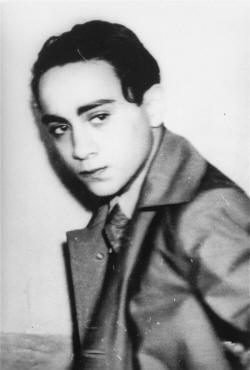Queer Places:
Burgstraße 36, 30159 Hannover, Germany
 Herschel Feibel Grynszpan (28 March 1921 – last rumoured to be alive 1945, declared dead 1960) was a German-born Jew of Polish heritage.
He was a gay Jewish youth who, in 1937, assassinated a Nazi official in a
Paris club frequented by homosexuals.
Herschel Feibel Grynszpan (28 March 1921 – last rumoured to be alive 1945, declared dead 1960) was a German-born Jew of Polish heritage.
He was a gay Jewish youth who, in 1937, assassinated a Nazi official in a
Paris club frequented by homosexuals.
Herschel Grynszpan was born in Hanover, Germany. His parents, Zindel and Rivka, were Polish Jews who had emigrated in 1911 and settled in Hanover. Zindel opened a tailor's shop, from which he earned a modest living. Because of the German Citizenship Law of 1913, based on the principles of jus sanguinis, Grynszpan was never a German citizen despite his German birth.[4] The family became Polish citizens after the First World War and retained that status during their years in Germany.[5] Grynszpan was the youngest of six children, only three of whom survived childhood. His parents' first child was stillborn in 1912. Their second child, daughter Sophie Helena (born in 1914), died of scarlet fever in 1928. A daughter (Esther) was born on 31 January 1916, and a son (Mordechai) on 29 August 1919. A fifth child, Salomone, was born in 1920 and died in 1931 in a road accident.
Grynszpan was theorized to have been acquainted with Rath before the shooting. According to this theory, Rath was homosexual and had met Grynszpan in Le Boeuf sur le Toit (a Paris bar). It is unclear if Grynszpan was alleged to be homosexual or was using his youth and appearance to win an influential friend. According to the theory, Rath had promised to use his influence to legalize Grynszpan's French residency. When Rath reneged on his promise, Grynszpan went to the embassy and shot him. According to a 2001 article in The Guardian, historian Hans-Jürgen Döscher planned to publish an updated edition of his Reichskristallnacht which indicated that Grynszpan and Rath had had a sexual relationship. Döscher quoted the diaries of French author André Gide, who wrote that Rath "had an exceptionally intimate relationship with the little Jew, his murderer": "The idea that such a highly thought-of representative of the Third Reich sinned twice according to the laws of his country is rather amusing."[30] However, Swiss-Canadian writer Corinne Chaponnière wrote in a 2015 essay that the quotation was incorrectly attributed to Gide.[31]
The Nazis used his assassination of the German diplomat Ernst vom Rath on 7 November 1938 in Paris as a pretext to launch Kristallnacht, the antisemitic pogrom of 9–10 November 1938. Grynszpan was seized by the Gestapo after the Fall of France and brought to Germany; his fate remains unknown. It is generally assumed that he did not survive World War II, and he was declared dead in 1960.[2] A photograph of a man resembling Grynszpan was cited in 2016 as evidence to support the claim that he was still alive in Bamberg, Germany, on 3 July 1946.[3]
The oratorio A Child of Our Time (1939-1941) was inspired by Michael Tippett's concern for the oppressed and his outrage over Nazi persecution of the Jews. The work is dedicated to Hershel Grynzpan.

